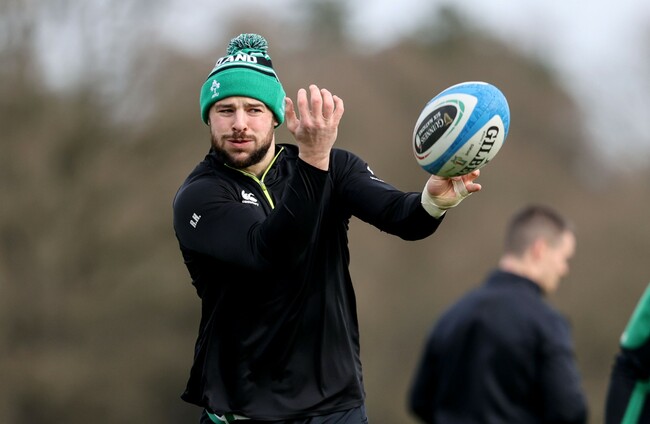YOU MAY HAVE heard, Ireland’s attacking game isn’t quite firing on all cylinders at the moment.
We’ve yet to figure out why exactly that is the case. The coaches say the onus on the players to think smarter on the pitch. The players, for their part, say they believe in what the men with the clipboards and whistles are preaching.
Give it time, they say, it’s coming.
It’s a little over a year since Andy Farrell took charge of his first Ireland game. Nobody could have anticipated the disruption that would follow, but Farrell and Ireland have now had 11 games together since Joe Schmidt stepped aside.
It’s fair to say all involved would like to be able to point to clearer signs of progress.
Problem is, stepping out of such a heavily structured, detail-oriented gameplan to a looser, more expressive one isn’t an easy transition to make.
Robbie Henshaw has been a key player under both head coaches. From his perspective, the end of the Schmidt era and start of the Farrell one has meant taking more ownership in terms of decision making.
“Based on me as an individual, it places the onus on myself, I need to challenge myself,” says Henshaw, who wins his 50th cap against Italy today.
“With defences being so good lately, (it’s about) how do you impose yourself, how do you find space and, I suppose, how do you find gaps. It was often unstructured kinda play (in the last year), it wasn’t planned, and the thing with Joe’s set up, it was very planned. The first three, four phases were very planned.
“It is probably an individual thing for me, how can I get better, how can I create something that is not planned.”
He’s been handling that adjustment well, with the Leinster centre providing some of the standout game-breaking moments of Farrell’s tenure so far.
The burst of pace and offload in the lead-up to Tadhg Beirne’s try against Wales is a recent sample of what Henshaw can offer in attack.
His wonderful solo effort against France last November is a more direct example of a player willing to take ownership to try create something for his team, collecting a Johnny Sexton switch pass before producing a superb step and acceleration to dart over.
“I don’t even think I said it to Johnny, he just caught my eye and my movement as I cut,” he explains.
“That’s the thing on the pitch, you just kind of work off each others’ body language. He has great spatial awareness and peripheral vision and he caught me cutting under.
“It kind of unfolded, the French boys in the lineout had knocked off and had started going towards where they think the ball was. I just had to skip through.”
Connacht and Leinster are two decent schools when it comes to learning that trade.
“I think every player needs to play heads-up rugby, particularly at this level because again, you know, defences are so much better, players are so much better, the time and space you have is reduced.
That’s what I was coached when I was younger in the Connacht Academy. When I was there with Nigel Carolan, he was a big believer of heads-up rugby and playing to where the space is.”
The problem for Ireland is that that ‘heads-up’ rugby hasn’t been proving too fruitful lately. The stat flung about this week is that Ireland are offloading the ball once every 54 carries, the lowest return among any of the Six Nations teams.
They’re also creating very little from all the possession they have enjoyed, scoring just two tries – another tournament low – and struggling to get themselves into the opposition 22.
Too often, Ireland have just looked a little lost for ideas in attack.
Playing unstructured rugby sounds like a difficult craft to practice outside the intensity of a match setting, but Henshaw says it’s a major part of the squad’s training week.
Once you get into a number of phases, then you’re deemed into an unstructured set-up. We practise it a lot here. Unstructured can be off a kick, a counter-attack, if a team knocks on a ball and you play quickly off the back of it, that’s all deemed as unstructured. We do practise those scenarios in training and it’s a huge part of our game.”
The lack of an offloading game, and the discussion around that, has filtered into the squad’s conversations too.
“Do we want to offload? 100%,” he continues.
“But I think firstly it’s about the individual with the ball. If you don’t win the collision in your carry, you can’t offload the ball, or if you’re hit by two men at once, you can’t offload the ball.
“So the big chat is about where we find the space and the holes. You have to find the space between the defenders or around the defenders, to get your hands free to offload.
“So yeah, we do want to play that brand of rugby and definitely reduce the amount of rucks because as you saw when we played France and they got a few of those unbelievable offloads for their first try, it shows you how hard it is to defend.
“Definitely, we have an onus on trying to build that and to up the stats.”
They won’t get many better platforms to get that attacking game motoring than in Rome today. Italy have shown signs of growth with regards their own intent on the ball under Franco Smith, but their defence still has a tendency to be easily punctured.
With scoring opportunities at a premium against both Wales and France, Farrell will hope his team can find more space to attack at the Stadio Olympico today. If that doesn’t transpire, then Henshaw says the team need to be able to adapt quickly and find other solutions.
Play what you see, not what you’ve anticipated.
“I think Italy have quite aggressive linespeed, and they do try to shut things down in the middle of the pitch,” he says.
“The pictures change constantly. For instance, we could look at Italy this week and say ‘Yeah, they are going to come hard off the line,’ and then first couple of phases, they don’t. So things constantly change and teams do have different strategies.
“So it’s about how we adapt on the pitch and how we can have the conversation that, ‘Right, they are not doing this, so let’s go to this plan.’
“So we always need to have a back-up.”
Bernard Jackman, Murray Kinsella and Gavan Casey look ahead to Italy-Ireland, discuss Joey Carbery’s positional future with province and country, and try to figure out what happens next with the postponed France-Scotland fixture:
The42 Rugby Weekly / SoundCloud



